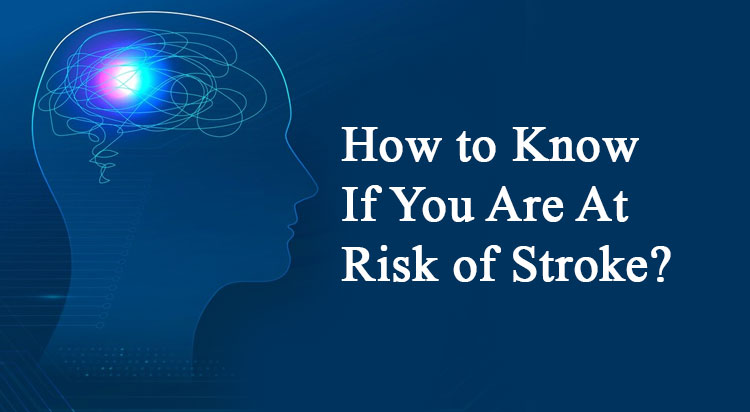Can anyone have a stroke? Well, it can happen to anyone, however, diabetics are two times more likely to have a stroke than people who don’t have diabetes.
We have often seen or heard that only old people have a stroke, but it’s not true. Not only the older people have a stroke but certain health conditions also affect the young. Hence, there’s no particular age factor to have a stroke.
In this blog, we will discuss everything about stroke that you should know to identify if you are at risk of stroke.
What is Stroke?
A stroke occurs when there’s a blockage in the blood supply to the brain. The blockage or any rupture interrupts the flow of blood and oxygen to the reach of the brain’s tissues. When the oxygen doesn’t reach the brain, it starts dying within a minute.
Types of Strokes
There are primarily three types of strokes:-
- Ischemic Stroke
- Hemorrhagic Stroke
- Transient Ischemic Stroke (TIA)
Ischemic Stroke – This occurs when the blood vessel that flows blood to your brain is ruptured or plugged. This happens due to fat deposits in the artery which causes blood clots in the brain due to the poor blood flow from an irregular heartbeat. This is one of the most common strokes that affect older people over the age of 65.
Hemorrhagic Stroke – Though it’s less common than Ischemic stroke it’s more serious. This type of stroke occurs when a weekend blood vessel leaks in the brain or the blood vessel balloons up and bursts, resulting in a sudden death. People who use blood thinners more often are at higher risk of Hemorrhagic Stroke.
Transient Ischemic Stroke (TIA) – This is also known as a ministroke that occurs when blood flow to the brain is temporarily blocked and it reverses on its own. This is a temporary problem and disappears after a few minutes or hours when the blood flow is restored.
Can Anyone Have a Stroke
Certainly, anyone can have a stroke. If you want to know if you are at risk of stroke and how to reduce the risk, then you must spot the signs of stroke.
Stroke doesn’t only affect older people but can strike young ones as well as children. One in four strokes happens to people of working age. Let’s understand your risk of stroke and support the necessary changes to reduce the risk.
Risk Factors for Stroke
You can treat some of the causes that put you at more risk of a stroke, however, some can’t be changed. We will discuss both to help you reduce your risk factors for a stroke. Some of the risk factors include:-
Diet
We all are aware of the fact that our diet plays an important role in our healthy lifestyle. And, it’s an important risk factor for stroke too. Your unbalanced diet can increase the risk factor of stroke. If your intakes are higher on salt, saturated fats, trans fats, and cholesterol then you are more likely to get a stroke than people with a balanced diet.
Inactivity
Lack of exercise and inactivity can put you more at risk of stroke. Doing daily exercise for 10-15 minutes a day, or adding simply a brisk walk for a few minutes every day can help you reduce the risk of stroke
Heavy alcohol use
If you have heard that moderation drinking alcohol has some health benefits then you haven’t heard anything wrong. But, you will have to keep your drink intake moderate only. Drinking too much alcohol increases blood pressure levels. So, limit your alcohol intake, for ex- one drink a day for women and two drinks for men.
Personal background
Some conditions that cause stroke are treatable, but some things related to your personal background that put you at risk can’t be changed. These are: –
Age
The bad news about stroke is that it can happen at any age. Even babies in the womb are at risk of stroke. But, the risk gets doubled as you grow older, especially after the age of 55. So, the older you get the more likely you are to have a stroke.
Family history
You can be at risk of stroke because of genetic health factors such as diabetes and high blood pressure.
Gender
Although women are at less risk of strokes than men of the same age. They have strokes at a later age, which is why the survival ratio of women is less than men and it results in death.
Health history
There are certain medical conditions and health histories that lead to stroke. We have listed the most common health conditions and diseases that cause strokes. And, if you have any of these conditions, you are probably at high risk of stroke.
- High blood pressure
- High cholesterol
- A previous stroke of TIA
- Diabetes
- Sickle cell disease
- Blood clotting disorder
- Irregular heartbeats
- Heart valve defect
- Coronary artery disease
You have seen the common risk factors of stroke. If you want about your specific risk factor for stroke, talk to your doctor. While it’s not possible to prevent or cure strokes completely, certain lifestyle changes can help in reducing the risk factor that leads to stroke. Also, some medications prescribed by your doctor help to reduce blood clots. That’s why it’s important to seek medical treatment as soon as possible.

